Do Banana Peels Keep Aphids Away? Find Out Here!
Ever wondered if there’s a simple, natural way to keep aphids out of your garden? Banana peels can help deter aphids, making them a handy, eco-friendly solution for organic gardening enthusiasts. The pungent smell of banana peels often keeps these pests at bay, providing a natural pest control method that’s safe and non-toxic.
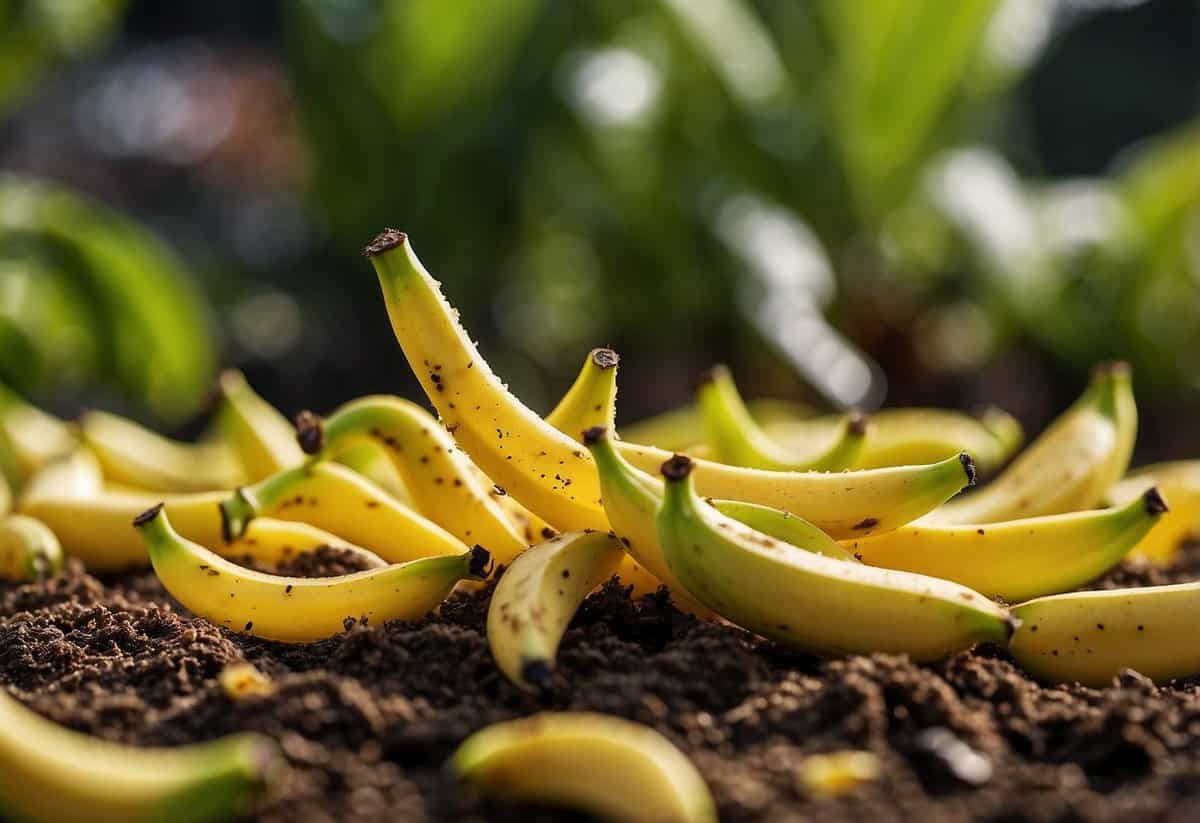
To use banana peels, you can either lay strips of the peel around the base of your plants or create a banana peel water solution. This solution is easy to make by soaking chopped peels in water for a couple of days. Spray this mixture onto your plants to keep the aphids away without relying on harsh chemicals.
Using banana peels not only helps in managing aphids but also adds nutrients to your garden. By incorporating this simple technique, you support both the health of your plants and the environment. Make your garden thrive with this effective, low-cost method.
Understanding Aphids and Their Impact on Gardens

Aphids are small insects that suck the sap from plants, often leading to serious damage and even plant death. These pests can disrupt the growth of many common garden plants, making it important to understand their behavior, the damage they cause, and which plants are most affected.
Lifecycle and Behavior of Aphids
Aphids have a complex lifecycle that allows them to reproduce quickly. They can be born live or hatch from eggs. These pests often gather in large numbers on the undersides of leaves, where they feed on the plant’s sap.
Rapid reproduction is a key trait, with some aphids capable of producing several generations in just one season. They are typically most active during the spring and summer months but can persist year-round in warmer climates.
Aphids also produce a sticky substance known as honeydew, which can attract other insects like ants. This honeydew can lead to the growth of sooty mold, further complicating the impact on your plants.
Damage Caused by Aphid Infestations
Aphids can cause significant damage to plants by sucking out their sap. This feeding process can weaken the plants, causing leaves to curl, yellow, or drop prematurely. Stunted growth is another common issue.
The presence of aphids can also lead to the spread of plant diseases. Aphids are known to transmit various plant viruses as they feed, which can be devastating for gardeners.
The damage caused by these pests can be extensive, often requiring immediate attention to prevent the loss of plants. Recognizing the signs of an aphid infestation early is crucial in maintaining a healthy garden.
Common Plants Affected by Aphids
Aphids can affect a wide variety of plants, both in gardens and greenhouses. Some of the most commonly affected plants include roses, tomatoes, cucumbers, and beans. These pests are not very selective and can infest both ornamental and edible plants.
Certain plants seem to attract aphids more than others, making them particularly vulnerable. For example, nasturtiums and petunias are often used as trap crops to lure aphids away from more valuable plants.
Monitoring these susceptible plants routinely can help you catch an infestation early. By understanding which plants are most likely to be affected, you can take specific steps to protect your garden.
The Role of Banana Peels in Aphid Control
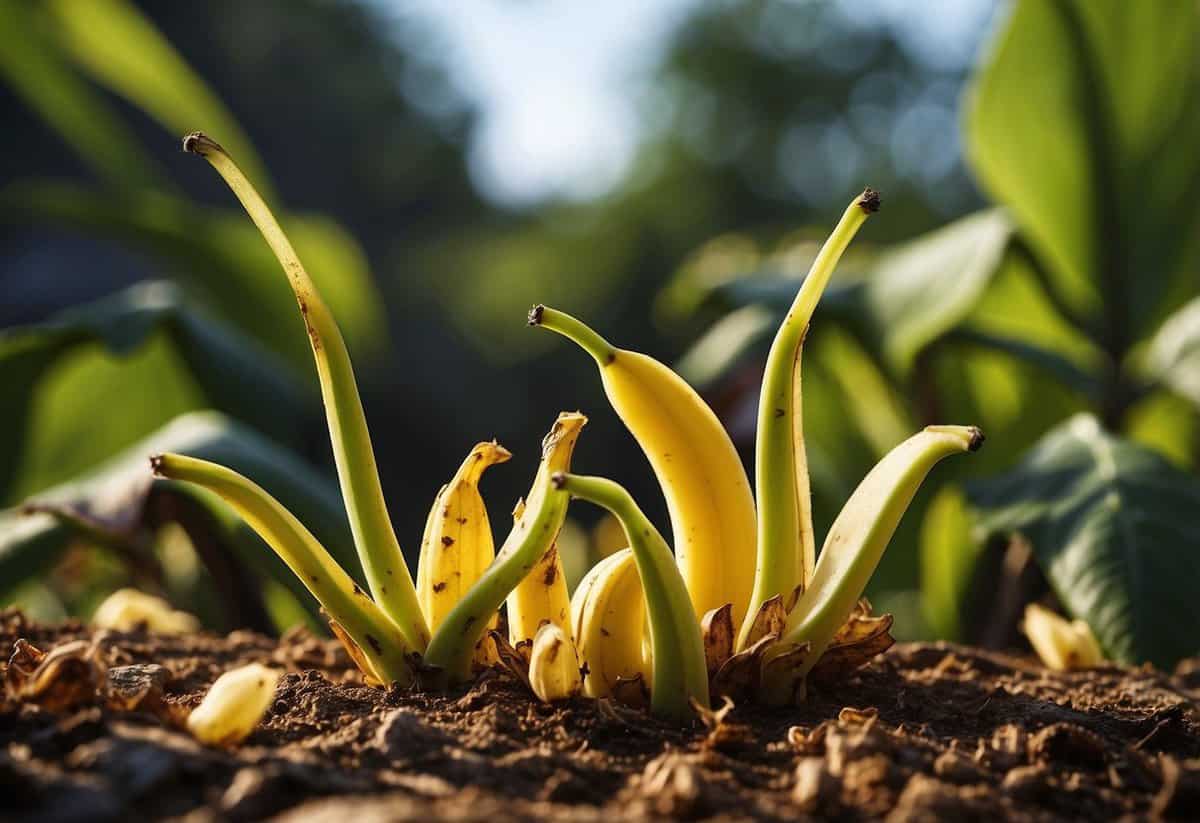
Banana peels can play a significant role in keeping aphids away from your garden. They not only help repel these pests but also enrich the soil with valuable nutrients. Learn more about how banana peels can be used effectively for aphid control.
Nutritional Content of Banana Peels
Banana peels are rich in nutrients such as potassium, phosphorus, and calcium. These essential minerals can help improve soil health. When you bury banana peels in your garden, they decompose and release these nutrients into the soil. This can strengthen your plants and make them less appealing to pests like aphids.
Potassium is particularly important because it helps plants grow stronger and more resistant to diseases. Phosphorus aids in root development, and calcium helps in building cell walls in plants. By adding these nutrients to the soil, you not only deter aphids but also boost your plants’ overall health.
How Banana Peels Repel Aphids
Banana peels release a scent that can help keep aphids away. Aphids find the smell unpleasant and are likely to avoid plants treated with banana peels.
One effective method is to cut banana peels into small pieces and bury them around the base of your plants. Doing this creates a barrier that aphids are less likely to cross.
You can also use banana peels as mulch. Spread chopped banana peels on the soil surface around your plants. This not just repels aphids but also slowly releases nutrients as the peels decompose, providing continuous benefits.
Making and Using Banana Peel Spray
You can create a banana peel spray to deter aphids effectively. Here’s a simple recipe:
- Cut banana peels into small pieces.
- Place the pieces in a container.
- Cover them with water and let it sit for 24-48 hours.
- Strain the mixture into a spray bottle.
Once your banana peel spray is ready, you can use it on your plants. Spritz the leaves and stems where aphids are likely to gather. The scent acts as a natural aphid deterrent.
Using this spray not only helps keep aphids at bay but also adds some nutrients to the plants. It’s a safe, natural way to protect your garden.
Complementary Eco-Friendly Aphid Deterrents
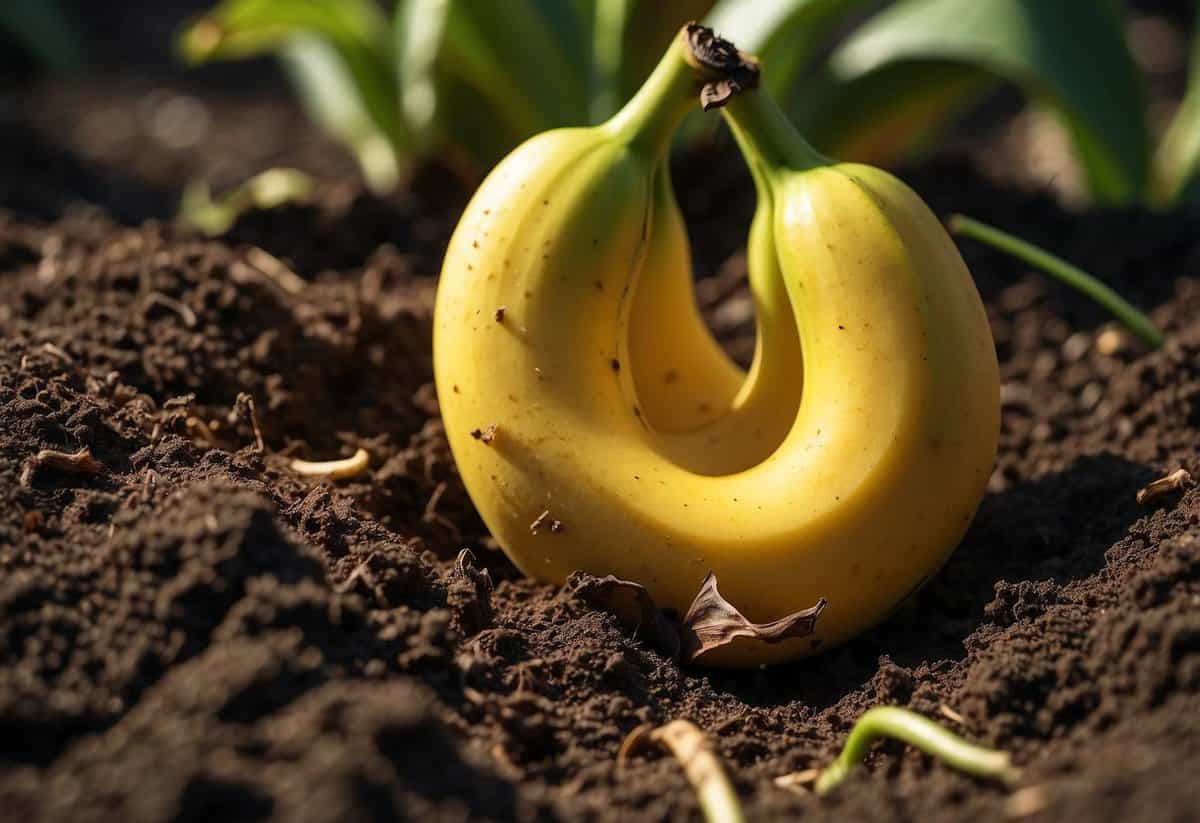
Aphids can wreak havoc on your garden, but there are several natural methods to control them. In addition to banana peels, you can use beneficial insects, homemade sprays, and create a supportive environment for your plants.
Natural Predators of Aphids
Introducing ladybugs and lacewings to your garden can help control aphid populations. These insects are natural predators that feed on aphids, reducing their numbers without harmful chemicals.
You can attract these beneficial insects by planting companion plants such as dill, fennel, and yarrow. These plants provide the perfect habitat and attract more predators.
Ladybugs are especially effective, as adult ladybugs and their larvae both eat aphids. Encouraging these helpful insects to stay in your garden can provide long-term aphid control.
Homemade Aphid Spray Recipes
Homemade sprays can be an effective way to manage aphids. Neem oil is an excellent choice. Mix one tablespoon of neem oil with a teaspoon of liquid soap and water. Spray this mixture on your plants to disrupt aphid feeding and reproduction.
Soap sprays are another option. Combine a few drops of dish soap with water and spray directly on the aphids. The soap breaks down their protective outer layer, causing them to dehydrate and die.
You can also use essential oils like peppermint or clove oil. Mix a few drops with water and spray on affected plants for a natural deterrent.
Cultivating a Healthy Ecosystem
Creating a healthy garden ecosystem is crucial for keeping aphids at bay. Plant a variety of flowers and vegetables to promote a balanced environment.
Companion plants such as marigolds, garlic, and chives can repel aphids naturally. These plants emit strong scents that aphids find unpleasant, keeping them away from your other plants.
Maintaining healthy soil is also important. Regularly add organic compost to your garden to ensure your plants are strong and resilient against pests. A well-balanced ecosystem supports plant health and reduces the likelihood of pest infestations.
Encouraging a diverse environment in your garden helps create a natural resistance to aphids and other pests.
Incorporating Banana Peels into Soil Health and Composting
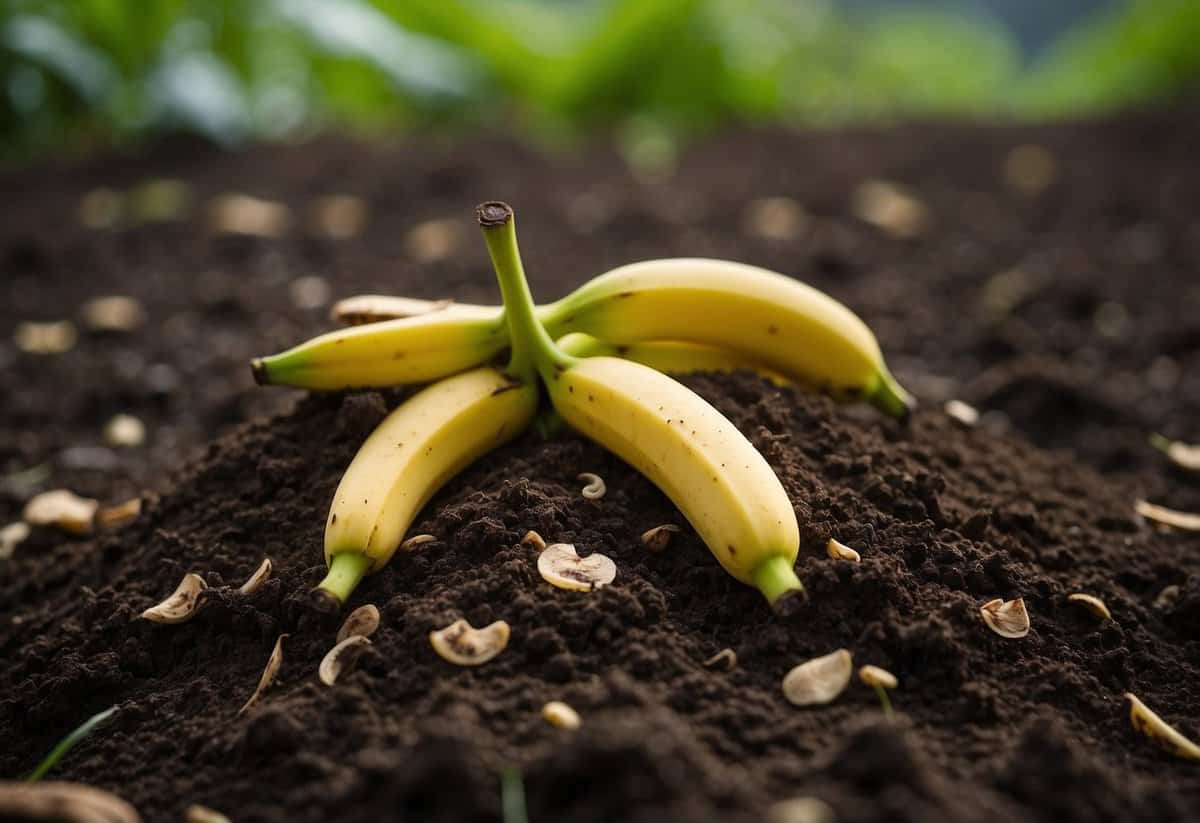
Using banana peels can improve soil fertility and help your compost. They are full of nutrients essential for plant growth and can be used in various ways for soil health.
Benefits of Banana Peels as Mulch
Banana peels make excellent mulch for your garden. When you lay them on the soil, they slowly break down, releasing nutrients. These nutrients include potassium, phosphorus, and calcium.
Potassium in banana peels helps plants grow strong roots. Phosphorus promotes flowering and fruiting. Calcium strengthens cell walls, reducing the chance of diseases. Spread banana peels in a thin layer around the base of your plants. Make sure they are partially buried to avoid attracting pests.
Mulching with banana peels also helps retain soil moisture. This is especially beneficial during hot months when the soil can dry out quickly. Plus, it prevents weeds from growing around your plants.
How to Compost Banana Peels Effectively
Composting banana peels is an easy and beneficial practice. Start by cutting the peels into small pieces. Smaller pieces decompose faster, adding nutrients to your compost more quickly.
Add the chopped banana peels to your compost pile. They add important nutrients like potassium, phosphorus, and nitrogen. Rotate the compost pile regularly to ensure even breakdown. This also prevents any unpleasant odors.
You can also try trench composting. In this method, bury the chopped banana peels directly into the soil. Dig a trench about 12 inches deep and place the peels 8 inches below the surface. This allows the peels to decompose slowly, feeding your plants over time.
Banana peels help the compost retain water, which is crucial for maintaining a healthy compost pile. They also make the soil lighter and more aerated when added to your garden. For more information, you can check tips on how to compost banana peels effectively.
Preventive Strategies Against Aphid Infestation
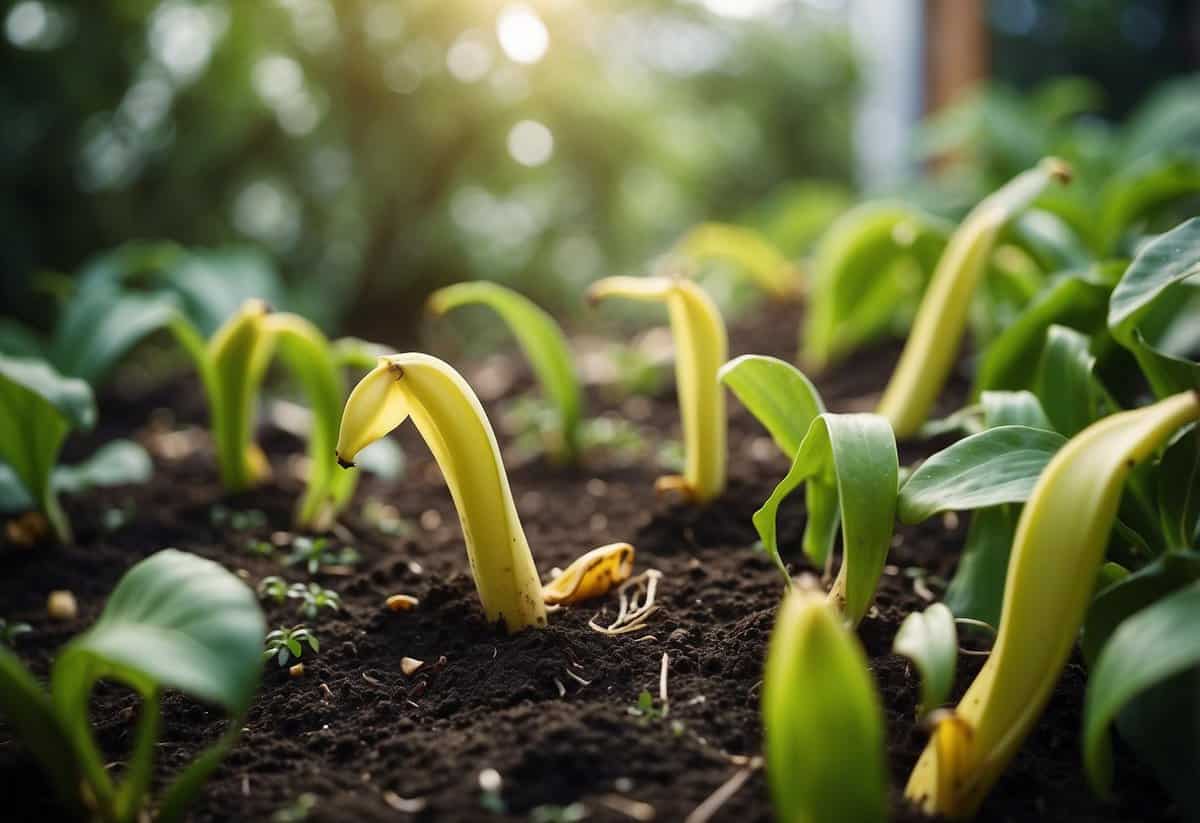
Preventing aphids in your garden involves using simple and effective practices. By incorporating good gardening habits and certain natural barriers or sprays, you can keep these pests at bay.
Gardening Practices for Prevention
Maintaining a healthy garden is key. Start by planting varieties that naturally repel aphids, such as marigolds, garlic, and chives. These plants’ scents discourage aphids from settling on your garden plants.
Regularly inspect your plants. Look for signs of aphids, like curled or yellowing leaves, and take action early. Removing affected leaves can prevent a larger infestation from taking hold.
Companion planting is another effective strategy. Pairing plants like beans with nasturtiums or petunias can serve as a deterrent. Aphids will be attracted to the companion plants instead of your main crops.
Finally, encourage beneficial insects like ladybugs and lacewings. These natural predators will help control aphid populations. You can attract them by growing dill and fennel, or buying them from garden supply stores.
Physical Barriers and Organic Sprays
Using physical barriers can keep aphids away from your plants. Floating row covers are effective. These are lightweight fabrics that cover plants, keeping aphids and other pests from reaching them while still allowing light and moisture through.
For smaller infestations, a strong spray of water can knock aphids off plants. You might need to repeat this daily, but it’s a simple and effective method.
Insecticidal soaps and organic sprays, like neem oil, can also help. These are safe for plants and animals but deadly to aphids. Apply the spray in the early morning or late evening to avoid harming beneficial insects.
Consider using diatomaceous earth around the base of plants. This natural powder is made from ground fossilized algae. It damages aphids’ exoskeletons, leading to their demise and preventing them from climbing up your plants.
Another home remedy is a mixture of water and vinegar. Spray this solution on infested plants to repel aphids and clean your plants. Make sure to test it on a small area first to avoid any potential damage to your plants.
By combining these preventive strategies, you can effectively manage and reduce aphid infestations in your garden.







